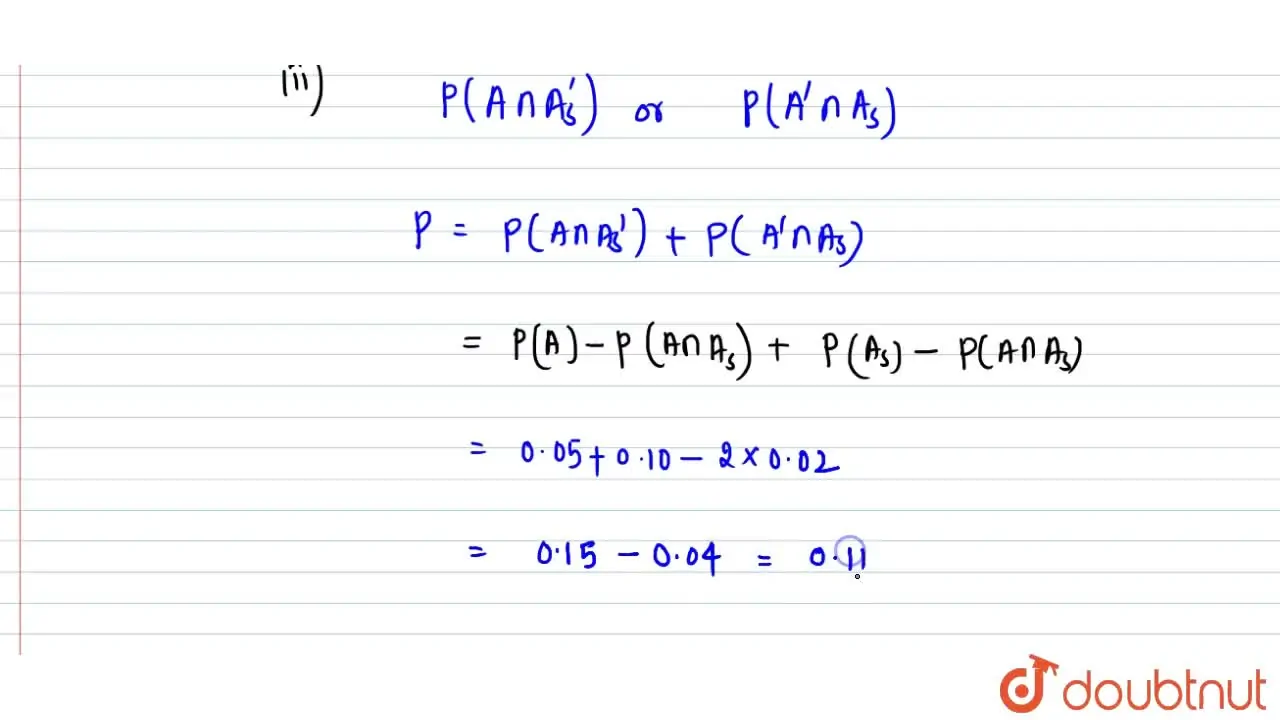Two students Anil and Ashima appeared in an examination. The probability that Anil will qualify the examination is 0.05 and that Ashima will qualify the examination is 0.10. The probability that both will qualify the examination is 0.02.
Find the probability that
(a) Both Anil and Ashima will not qualify the examination.
(b) Atleast one of them will not qualify the examination and
(c) Only one of them will qualify the examination.
The correct Answer is:(a) 0.87
(b) 0.98
(c) 0.11
Let E and F denote the events that Anil and Ashima will qualify the examination,
respectively.
Given that P(E)=0.05,P(F)=0.10 and P(E∩F)=0.02.
(a) The event "both Anil and Ashima will not qualify the examination" may be
expressed as E'∩F'.
Since, E' is ‘not E’, i.e., Anil will not qualify the examination and F' is ‘not F’, i.e., Ashima will not qualify the examination.
Also E'∩F'=(E∪F)' (by De-morgan's Law)
Now P(E∪F)=P(E)+P(F)–P(E∩F)
⇒P(E∪F)=0.05+0.10–0.02=0.13
∴P(E'∩F')=P(E∪F)'=1–P(E∪F)=1–0.13=0.87
(b) P (atleast one of them will not qualify)
= 1 – P(both of them will qualify)
= 1 – 0.02 = 0.98
(c) The event only one of them will qualify the examination is same as the event either (Anil will qualify, andAshima will not qualify) or (Anil will not qualify and Ashima will qualify) i.e., E∩F' or E'∩F, where E∩F' and E'∩F are mutually exclusive.
Therefore, P(only one of them will qualify) = P(E∩F'orE'∩F)
=P(E∩F')+P(E'∩F)
=P(E)–P(E∩F)+P(F)–P(E∩F)
=0.05–0.02+0.10–0.02=0.11
Related Playlists
- BOOK - NCERTCHAPTER - PROBABILITYEXERCISE - MISCELLANEOUS EXERCISE10videos
PROBABILITY
- BOOK - NCERTCHAPTER - PROBABILITYEXERCISE - EXERCISE 16.116videos
PROBABILITY
- BOOK - NCERTCHAPTER - PROBABILITYEXERCISE - EXERCISE 16.321videos
PROBABILITY
- BOOK - NCERTCHAPTER - PRINCIPLE OF MATHEMATICAL INDUCTIONEXERCISE - EXERCISE 4.124videos
PRINCIPLE OF MATHEMATICAL INDUCTION
- BOOK - NCERTCHAPTER - RELATIONS AND FUNCTIONSEXERCISE - EXERCISE 2.35videos
RELATIONS AND FUNCTIONS
Similar Questions
Two students Anil and Ashima appeared inan examination. The probability that Anil will qualify the examination is 0.05 and that Ashima will qualify the examination is 0.10. The probability that both will qualify the examination is 0.02. Find the probability that:
(i) bothAnil and Ashima will not qualify the examinatiion.
(iii)only one of them willl qualify the examination.View SolutionTwo students Anil and Ashima appeared in an examination. The probability that Anil will qualify the examination is 0.05 and that Ashima will qualify the examination is 0.10. The probability that both will qualify the examination is 0.02. find the probability that: i. Both Anil an Ashima will not qualify the exam ii. At least one of them will not quality the exam iii. Only one of them will qualify the exam.
View SolutionTwo students X and Y appeared in an examination. The probability that X will qualify the examination is 0.05 and Y will qualify the examination is 0.10. The probability that both will qualify the examination is 0.02. What is the probability that only one of them will qualify the examination?
View SolutionIf the probability of A to fall in an examination is 0.2 and that for B is 0.3, then probability that either A or B is fail, is:
View SolutionIf the probabilities for A to fail in an examination is 0.2 and that for B is 0.3, then the probability that either A or B fails is
View SolutionIf the probabilities for A to fail in an examination is 0.2 and that for B is 0.3, then the probability that either A or B fails is
View SolutionYou have qualifying the competitive examination.
View SolutionThe probability that a student will pass the final examination m both English and Hindi is 0.5 and the probability of passing neither is 0.1. If the probability of passing the English examination is 0.75, what is the probability' of passing the Hindi examination?
View SolutionThe probability that a student will pass the final examination in both English and Hindi is 0.5 and the probability of passing neither is 0.1. If the probability of passing the English examination is 0.75. What is the probability of passing the Hindi examination?
View SolutionIf the probabilities for A to fail in an examination is 0.2 and that for B is 0.3, then the probability that either A or B fails is
View Solution


